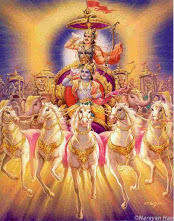Gita : Ch-7. Slo-29.
Srimad Bhagavad-Gita :
Chapter-7. ( Jnana-vijnana-yogam )
Slokam-29. ( Intelligent persons who are endeavoring for liberation from old age and death take refuge in Me in devotional service. They are actually Brahman because they entirely know everything about transcendental and fruitive activities.)
jaramaranamokshaya mamasritya yatanti ye,
te brahma tadviduh krtsnam adhyatmam karma cakhilam.
ye jara-marana-mokshaya = for the purpose of liberation from old age and death, who,
mam asritya yatanti = completely surrender, depending on Me, and work hard ( endeavor );
te tat brahma = such persons actually that Brahmam too;
krtsnam adhyatmam = all, ( everything ) transcendental;
akhilam karma ca viduh = also they know complete ( entire ) karmam.
Birth, death, old age and diseases affect this material body, but not the spiritual body.
There is no birth, death, old age and disease for the spiritual body, so one who attains a spiritual body, becomes one of the associates of the Supreme Personality of Godhead and engages in eternal devotional service, is really liberated.
Aham brahmasmi : I am spirit. It is said that one should understand that he is Brahman-spirit soul.
This Brahman conception of life is also in devotional service, as described in this slokam.
The pure devotees are transcendentally situated on the Brahman platform, and they know everything about transcendental and material activities.
Four kinds of impure devotees who engage themselves in the transcendental service of the Lord achieve their respective goals, and by the grace of the Supreme Lord, when they are fully Krishna conscious, they actually enjoy spiritual association with the Supreme Lord.
But those who are worshipers of demigods never reach the Supreme Lord in His supreme planet.
Even the less intelligent Brahmam-realized persons cannot reach the supreme planet of Krishna known as Goloka Vrndavana.
Only persons who perform activities in Krishna consciousness (mam asritya) are actually entitled to be called Brahman, because they are actually endeavoring to reach the brahmam. Such persons have no misgivings about Karmaa, and thus they are factually Brahman.
Deliverance from old age, disease and death signifies the disenchantment and disjunction from material desires and connections by achieving atma tattva or realisation of the soul and comprehending its distinctness from physicality replacing it with spiritual knowledge and connections.
Those who seek and worship the Supreme Lord Krishna with this objective have to understand what brahman or the spiritual substratum pervading all existence which refers to the arttas or aspirants in slokam 16.
Have to know what adhyatmam or the individual souls which refers to the jijnasur or soul seekers in slokam 16 and must know karma cakhilam or the different kinds of fruitive actions with their subsequent reactions this refers to the jnani or seeker of spiritual knowledge in slokam 16.
Thereafter worshipping the Supreme Lord Krishna such enlightened devotees become blessed and acquire knowledge of everything to be known.
This is specified by the words te brahma tad viduh krtsnam meaning they get knowledge of the brahman the spiritual substratum pervading all existence and everything else of consequence.
They with pure hearts who take complete refuge in the Supreme Lord being free from the sway of duality and any ideas of rewards for the actions they perform, even for moksa or liberation from the cycle of birth and death.
Such enlightened beings understand the entire field of action to be performed in the material manifestation meaning what is to be done and what is not to be done and the total purpose of embodied existence as a human being.
Therefore those who have purified their consciousness after innumerable lifetimes performing meritorious spiritual activities get the association of a pure devotee of the Supreme Lord Krishna and have the opportunity to exclusively worship Him.
Becoming His devotee they come to know all that is to be known are completely satisfied.
This is being stated with the words jara-marana-moksaya meaning desiring freedom from old age and death.
Knowledgeable of the supreme brahman or the spiritual substratum pervading all existence, cognisant of the atma or eternal soul and aware that it is distinct from the physical body of every sentient being; such people take exclusive shelter of the Supreme Lord Krishna and diligently apply themselves in His exclusive service following the instructions of the spiritual master in one of the four authorised Vaisnava parampara or disciplic succession.
Those who are engaged in worshiping the form or arca of the Lord or who are engaged in meditation on the Lord simply for liberation from material bondage, also know, by the grace of the Lord, the purports of Brahman, adhibhuta, etc., as explained by the Lord in the next chapter.
To be continued ...





Comments
Post a Comment